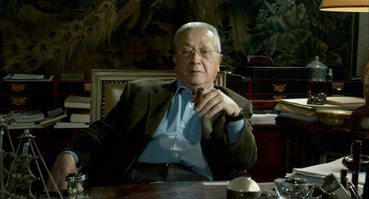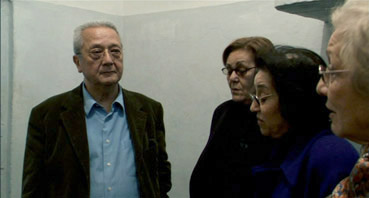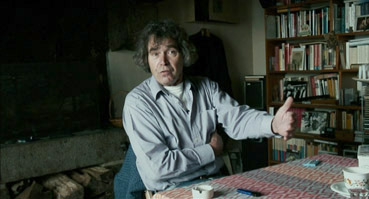| |
"I was asked: 'Would you defend Hitler?' I said I'd even defend Bush! But only if he agrees to plead guilty." |
| |
Jacques Vergès, lawyer |
It's surprisingly easy to form a first impression on the briefest of descriptions. Take Jacques Vergès. If I told you he was a self-confident, perhaps even self-righteous lawyer with a fondness for big cigars, I'm sure a good many of you will have already formed a less than flattering picture in your head. Others, of course, will not be so easily swayed. So how about if I tell you that his past clients include leading members of the Khmer Rouge, Nazi war criminal Klaus Barbie, associates of renowned terrorist Carlos the Jackal, and holocaust denier Roger Garaudy. One of his more recent clients was Slobodan Milosevic, the former Serbian leader on trial for crimes against humanity. How's that neutrality meter doing now? All of which may not suggest a man you'll instantly warm to, but it does make him a potentially interesting subject for a documentary feature.
Barbet Schroeder is no stranger to documentary portraits of controversial figures. His 1974 General Idi Amin Dada: Autoportrait was a surprisingly even-handed profile of the Ugandan dictator made with Amin's full cooperation, but one whose seeming neutrality cleverly allowed its subject to unknowingly damn himself. This might lead you to expect a similarly sly critical approach here, a willing interviewee whose own words might trip him up or, as in Errol Morris's memorable 1999 Mr. Death: The Rise and Fall of Fred A. Leuchter, Jr., whose own actions and prejudices might lead to his downfall. If so, then you'll have a long and almost fruitless wait. Vergès is a smart man who provides disarmingly persuasive justification for many (though not all) of his client choices. But he's also carefully guarded about just how much information he's prepared to let slip. Well he is a lawyer, after all.

It's this caginess, coupled with a degree of polite cooperation on Schroeder's part, that calls into question whether Terror's Advocate is actually a film about Vergès or those he has been involved with. Technically it's about both, of course, but we never really get to know Vergès beyond what he is prepared to reveal or what Schroeder infers of him through the lives and words of others, whose stories the lawyer becomes one of a number of contributory witnesses to. What emerges is a film in which Vergès shifts from being the central character to the thread that connects the chapters, a seemingly unlikely but true-life link between some of the most notorious figures of late 20th century history.
While many of the facts of the two most featured stories will be familiar for anyone who has read up on the Algerian FLN or the activities Carlos the Jackal, it's always intriguing to hear events described by those who were directly involved, personalising the history and providing the sort of intimate detail that third party coverage often excludes. Occasionally, this can be a little disconcerting, as with the casual interviews about the bombing of public places by those who planted the explosives, acts that some of them still look back on through idealistic eyes.
Intermittently, the nature of Vergès' involvement with his clients is returned to centre stage, though it's often down to the testimony of others to clarify the detail. Initially driven by idealism and a strong empathy with his clients and their causes, there's the suggestion that some of his later case choices were driven as much by money and a thirst for notoriety as his passionate anti-colonialism, while he himself appears to relish the challenge of going up against overwhelming odds. "It was exhilarating," he remembers enthusiastically of his defence of Klaus Barbie. "There's thirty-nine lawyers on the other side and I'm all alone. It means each one of them is only worth a fortieth of me." Just a short while later, though, he offers an more idealistic reasoning when he states, "I can't stand a man being humiliated. Even an enemy. For a lone man to be insulted by a lynch mob." Of course, in the case of Klaus Barbie this means turning a blind eye to the atrocities dished out by the far more unpleasant mob that Barbie himself was once an active member of.

While the decision to focus primarily on Vergès' involvement with two specific groups has clear and effective purpose – the Algerian FLN to engage audience sympathy and understanding for his initial involvement with this group, Carlos for the parallels with Vergès's own life choices – this does result in the sidelining and even omission of clients I personally was itching to hear more about. Given the build-up he himself gives to the disruptive technique he employed in his defence of Klaus Barbie ("What ploy will that bastard come up with today?" he imagined the prosecution asking themselves, offering the response, "And being imaginative, he found one every day"), it's a little frustrating when we are shown no examples of his game plan or how the prosecution responded to it. This is emphasised by the end credits role-call of controversial clients whose lack of coverage here can't help but make the story, in spite of the film's length, feel incomplete, like an extended episode from a series on Vergès and his cases rather than a complete work.
In the context of Schroeder's chosen structure, however – a study of a man who has spent much of his adult life trying to recapture the excitement and passion and love of his youth – this imbalance makes a lot of sense and proves consistently interesting viewing in its own right, and was certainly enough to secure it Best Documentary at the 2007 Cesar Awards. Vergès' controlled caution even allows him to retain an intriguing enigma and adds to the sense that there's a lot more to this guy than meets the eye, a suspicion heightened by the late-film inclusion of potentially incriminating reports by the former East German secret service. Even so, I couldn't shake the feeling that there's a whole second film's worth of material on Vergès just waiting to be told, although one, I suspect, that Vergès himself would be unlikely to cooperate with the making of. Then again, who knows? As this film repeatedly suggests, the only one who can be sure what Vergès will do next, or quite why he will do it, is Vergès.
A crisp 1.85:1 anamorphic transfer of a film constructed from a variety of media, with even the newly conducted interviews on more than one format (there's an end credit for 'petite camera'), but the best material boasts good contrast, detail and colour, and the varied archive material looks as good as you could hope for. Grain is variable depending on the media, though extracts from Battle of Algiers are in very good shape. Newspaper and graphic material is sharp and without any digital noise, always a good measure. The film upsacles well with no obvious issues.

There's a choice between the Artificial Eye favourites of Dolby 2.0 stereo and Dolby 5.1 surround, and though the stereo is perfectly serviceable, the 5.1 track is a more subtle and pleasing mix. The surrounds aren't extensively used, but kick in effectively in some of the post-mixed archive footage and the music score. The quality of the sound recording is generally fine, but a couple of the interviews interviews sound as if the filmmakers were stuck with the on-camera mic.
Interview with Barbet Schroeder (25:24)
A standard Artificial Eye inclusion and a typically useful one, not least for cluing you in to Schroeder's approach to the project, both structurally and technically. There's some really interesting stuff here, not least the trouble taken with the location and framing of each of the interviews, to the degree that a platform was constructed to raise one of the interviewees to the height where the background Schroeder desired was more clearly visible. The horrible framing of the first couple of minutes is corrected in what feels like a restart, with Schroeder effectively repeating much of what he's just said.
The Theatrical Trailer (1:32) is a nifty and persuasive sell, while the Director's Filmography is actually a biography, which runs for three pages and covers the basics.
A consistently interesting and intermittently fascinating study of a controversial but enigmatic figure, one who manages to most effectively keep his guard up even when he seems to be letting it drop. I'd still have liked more on some of those other clients, but those that are covered are dealt with in some detail, and if you're new to the Algerian conflict or Carlos and his crew then Terror's Advocate provides a comprehensive and worthwhile history lesson.
|